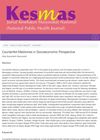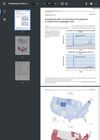 December 2021 in “Acta Marisiensis”
December 2021 in “Acta Marisiensis” Insulin resistance increases the risk of developing type 2 diabetes and other health issues.
13 citations,
September 2022 in “Biomolecules” The research confirms that Hidradenitis Suppurativa is characterized by increased inflammation, disrupted skin cell organization, and abnormal metabolic processes.
37 citations,
December 2017 in “Journal of Investigative Dermatology Symposium Proceedings” Black and Hispanic women are more likely to have alopecia areata than white women.
[object Object]  January 2024 in “Journal of Cosmetic Dermatology”
January 2024 in “Journal of Cosmetic Dermatology” Smoking increases the risk of male pattern hair loss.

Men with male pattern baldness are more likely to have unhealthy blood lipid levels, which could signal other health issues.
A hat with sensors can measure scalp moisture well, helping with hair care.
 October 2022 in “Egyptian Journal of Health Care”
October 2022 in “Egyptian Journal of Health Care” Female nursing students with iron deficiency anemia have poor knowledge and practices regarding iron intake, needing better health education and physical monitoring.
 30 citations,
September 2020 in “Journal of Patient-Reported Outcomes”
30 citations,
September 2020 in “Journal of Patient-Reported Outcomes” Alopecia Areata (AA) causes significant emotional distress, including feelings of embarrassment, depression, and anxiety, and impacts social interactions and daily activities.
 29 citations,
October 2020 in “eLife”
29 citations,
October 2020 in “eLife” Higher testosterone levels can increase the risk of certain diseases like type 2 diabetes in women and prostate cancer in men, but can also protect against autoimmune diseases and hair loss. It also affects body fat and bone density.
20 citations,
January 2016 in “International journal of trichology” Young Indians with premature graying often have lower levels of certain nutrients and unhealthy lifestyles.
 2 citations,
May 2017 in “Kesmas: Jurnal Kesehatan Masyarakat Nasional”
2 citations,
May 2017 in “Kesmas: Jurnal Kesehatan Masyarakat Nasional” Counterfeit medicines are most common in developing countries and vary with a country's level of development.
 January 2025 in “Journal of Cosmetic Dermatology”
January 2025 in “Journal of Cosmetic Dermatology” The supplement improved hair growth and quality in men with thinning hair and was safe to use.
 December 2024 in “JEADV Clinical Practice”
December 2024 in “JEADV Clinical Practice” Androgenetic alopecia is linked to a higher risk of varicose veins, especially in men, but not to major vascular diseases.
 April 2024 in “Skin research and technology”
April 2024 in “Skin research and technology” Celebrity endorsements can greatly increase interest in cosmetic procedures.
 April 2023 in “Nigerian Journal of Clinical Practice”
April 2023 in “Nigerian Journal of Clinical Practice” Hair loss in adults is linked to heart disease risk factors like unhealthy blood fats, lack of exercise, and alcohol use. It's also slightly more common in people with metabolic syndrome. As people age, hair loss gets worse. In men, severe hair loss is tied to high blood pressure and a larger waist. In women, it's tied to higher body weight. People with hair loss should be checked for unhealthy blood fats and advised to avoid alcohol and inactivity.
Women with and without PCOS show no significant differences in psychopathic traits.
 June 2016 in “The Egyptian Journal of Fertility and Sterility”
June 2016 in “The Egyptian Journal of Fertility and Sterility” The study concluded that personalized treatment, including medical and cosmetic approaches, is effective for women with PCOS and hirsutism.
[object Object] April 2023 in “Andrologia” American men are older, more obese, and have longer infertility than Canadian men.
 14 citations,
April 2022 in “Climacteric”
14 citations,
April 2022 in “Climacteric” Menopause causes dry skin, wrinkles, and hair changes, with hormone therapy helping but not recommended just for these issues.
 9 citations,
December 2022 in “Phytomedicine”
9 citations,
December 2022 in “Phytomedicine” More high-quality research is needed to recommend flavonoids and saponins for clinical use.
9 citations,
January 2018 in “Indian Journal of Endocrinology and Metabolism” Androgenetic alopecia is significantly linked to metabolic syndrome.
 4 citations,
October 2022 in “Nutrients”
4 citations,
October 2022 in “Nutrients” Personalized diets, like the Mediterranean Diet and low carb diets, can help manage PCOS symptoms in obese women, and probiotics may enhance weight loss and improve metabolic health. More research is needed to find the best diet strategies.
 4 citations,
August 2021 in “Clinical and Experimental Reproductive Medicine”
4 citations,
August 2021 in “Clinical and Experimental Reproductive Medicine” The 2018 guideline for PCOS suggests new diagnostic criteria and treatments, but recognizes the need for more research.
4 citations,
February 2018 in “EMBO reports” New DNA analysis and machine learning are advancing forensic science, improving accuracy and expanding into non-human applications.
 2 citations,
January 2023 in “Pharmaceuticals”
2 citations,
January 2023 in “Pharmaceuticals” Natural products and phytochemicals may help with hair regrowth, but more research is needed.
2 citations,
January 2021 in “PubMed” Botulinum toxin type A may help treat hidradenitis suppurativa.
1 citations,
January 2024 in “Journal of personalized medicine” Hormonal imbalances during menopause may significantly contribute to Frontal Fibrosing Alopecia.
 December 2024 in “Archiv Euromedica”
December 2024 in “Archiv Euromedica” Early diagnosis and personalized treatment are crucial for managing PCOS and preventing complications.

Women with PCOS often face menstrual issues, weight gain, and stress, affecting their quality of life.
 August 2024 in “Nutrition Bulletin”
August 2024 in “Nutrition Bulletin” GLP-1 receptor agonists help with weight loss but need to be combined with other treatments for best results.




















